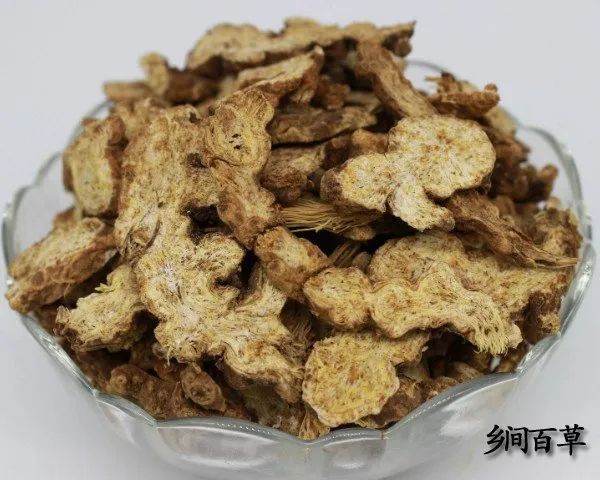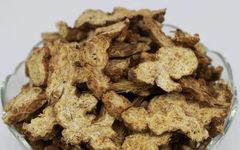The Efficacy, Functions, and Contraindications of Cang Zhu (Atractylodes) and Its Consumption Methods
Cang Zhu, also known as Mao Zhu, Mao Cang Zhu, Jin Cang Zhu, Han Cang Zhu, Chi Zhu, Jing Mao Zhu, Jing Cang Zhu, Tian Jing, Xian Jiang, Da Cang Zhu, can dry dampness, strengthen the spleen, dispel wind, and scatter cold, as well as improve vision. It is used to treat dampness obstructing the middle jiao, abdominal distension, diarrhea, edema, beriberi, rheumatic pain, wind-cold common cold, night blindness, and blurred vision.

Cang Zhu
【Name】Cang Zhu
【Alias】Mao Zhu, Mao Cang Zhu, Jin Cang Zhu, Han Cang Zhu, Chi Zhu, Jing Mao Zhu, Jing Cang Zhu, Tian Jing, Xian Jiang, Da Cang Zhu.
【Source】Cang Zhu is the rhizome of the Asteraceae plant, either Nan Cang Zhu or Bei Cang Zhu.
【Classification】Aromatic Dampness-Transforming Herb
【Properties】Pungent, bitter, warm.
【Efficacy】Dries dampness, strengthens the spleen, dispels wind, scatters cold, and improves vision.
【Indications】Used for dampness obstructing the middle jiao, abdominal distension, diarrhea, edema, beriberi, rheumatic pain, wind-cold common cold, night blindness, and blurred vision.
【Dosage】3-9 grams.
【Source】2015 Edition of the Pharmacopoeia
The Efficacy, Functions, and Contraindications of Cang Zhu
【Efficacy and Functions of Cang Zhu】Dries dampness, strengthens the spleen, dispels wind, scatters cold, and improves vision. It treats dampness obstructing the middle jiao, abdominal distension, diarrhea, edema, beriberi, rheumatic pain, wind-cold common cold, night blindness, and blurred vision.
1. For treating dampness causing body pain: Cang Zhu, soaked and sliced, decocted in water to extract a concentrated juice, then reduced to a paste, taken with warm water. (From “Simple Prescriptions”)
2. For treating damp-heat with excessive sweating: 6 liang of Zhi Mu, 2 liang of Gan Cao (honey-fried), 1 jin of Shi Gao, and 3 liang of Cang Zhu, and 3 liang of Jing Mi. Grind to a size of mung bean. Each dose is 5 qian, boiled with 1.5 cups of water until reduced to 6 fen of clear juice, taken warm. (From “Classified Evidence for Life”) Bai Hu Jia Cang Zhu Tang
3. For treating disharmony of the spleen and stomach, loss of appetite, distension and stabbing pain in the heart and abdomen, bitter taste with no flavor, nausea and vomiting, and frequent diarrhea: 5 jin of Cang Zhu (peeled and soaked in rice wash for two days), 3 jin 2 liang each of Hou Po (peeled, processed with ginger juice, and stir-fried until fragrant) and Chen Pi (white part removed), and 30 liang of Gan Cao (stir-fried). Grind to a fine powder. Each dose is 2 qian, boiled with 1 cup of water, adding 2 slices of fresh ginger and 2 dried jujubes, decocted until reduced to 7 fen, remove ginger and jujubes, and take warm before meals; adding a pinch of salt and taking with boiling water is also acceptable. (From “Prescriptions of the Bureau”) Ping Wei San
4. For treating dampness in the Taiyin spleen channel, with watery diarrhea, slight heaviness and fullness in the body, weakness and lack of strength, loss of appetite, and profuse diarrhea: 2 liang of Cang Zhu, 1 liang of Shao Yao, and half a liang of Huang Qin. Grind together, each dose is 1 liang, adding half a qian of light-flavored cinnamon, boiled with 1.5 cups of water until reduced to 1 cup, taken warm. (From “Suwen on Disease Mechanisms and Life Preservation”) Cang Zhu Shao Yao Tang
【Contraindications of Cang Zhu】Contraindicated for those with yin deficiency and internal heat, and those with qi deficiency and excessive sweating.
1. From “Discussion on Medicinal Properties”: Avoid peaches, plums, sparrow meat, cabbage, and blue fish.
2. From “Compendium of Materia Medica”: Fang Feng and Di Yu are used as assistants.
3. From “Correcting Materia Medica”: Avoid use in cases of internal heat and yin deficiency, and those with profuse sweating.
4. From “Introduction to Medicine”: Use cautiously in cases of blood deficiency and weakness, and those with emotional distress and qi stagnation. Misuse can deplete qi and blood, dry body fluids, and exacerbate internal heat and fullness.
5. From “Commentary on Materia Medica”: For conditions of yin deficiency, blood deficiency, insufficient essence, internal heat, dry mouth and lips, cough with phlegm, hemoptysis, epistaxis, throat obstruction, and constipation, it is advised to avoid use. Those with liver and kidney qi stagnation should not take it.
Dietary Therapy Methods
1 Job’s Tears and Glutinous Rice Porridge
Ingredients: 30 grams of Yi Yi Ren, 20 grams each of Yun Ling and Cang Zhu, 15 grams of Mu Guo, and 60 grams of glutinous rice.
Method: After decocting the four herbs to extract a concentrated juice and removing the dregs, cook with glutinous rice to make porridge, consumed twice daily as a staple food.
Efficacy: Promotes dampness elimination, opens channels, and dispels wind. Suitable for damp bi syndrome, with symptoms of severe joint pain, limb numbness, and general fatigue.

